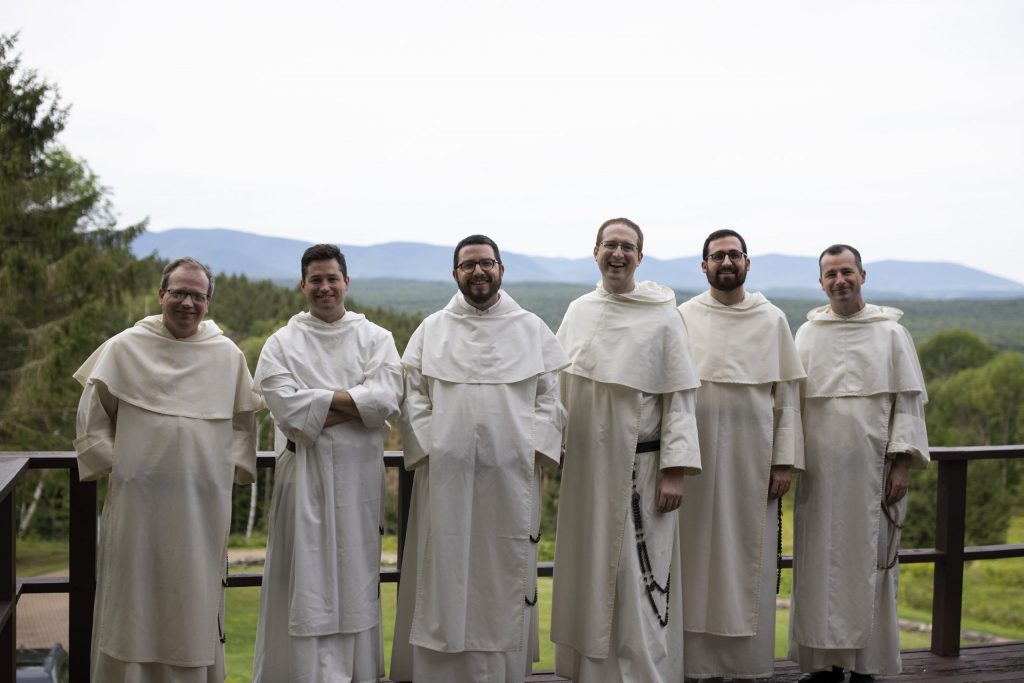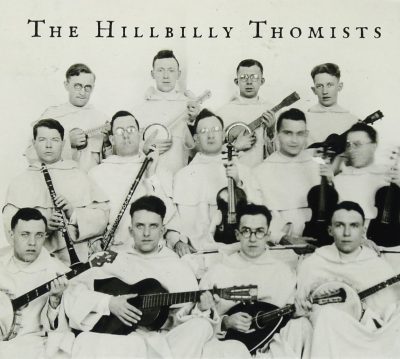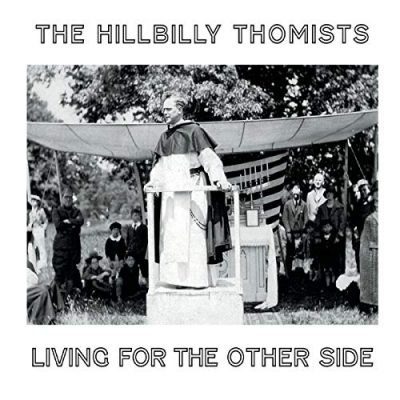The Hillbilly Thomists Are Back

The Hillbilly Thomists are a bluegrass band composed of Catholic priests of the Dominican order (formally, the Order of Preachers, which is why you see the initials “O.P.” after a Dominican priest’s name). Their first album, 2018’s The Hillbilly Thomists, was received to great surprise (because who knew Dominicans could play bluegrass?) and even greater acclaim (these Dominican boys really can play and sing!).

Last week, the Hillbilly Thomists released their follow-up album, the exhilarating Living For The Other Side, which, if the first album didn’t convince you, proves beyond a shadow of a doubt that these preachers are not a novelty act, but true artists and evangelists via the medium of American folk music.

The band agreed to do an interview with me via e-mail. It follows:
ROD DREHER: For those who don’t know the band, explain the origin of the name Hillbilly Thomists.
FR. AUSTIN LITKE, O.P.:The name comes from a passage in the letters of Flannery O’Connor where in 1955 she wrote: “Everybody who has read Wise Blood thinks I’m a hillbilly nihilist, whereas . . . I’m a hillbilly Thomist” (Letter to Robie Macauley of 18 May 1955, in The Habit of Being, p. 81). In the mid-2000s, Fr. Thomas Joseph White, a Georgia native, and Fr. Austin Litke, who hails from Kentucky, started playing Bluegrass music as a hobby in an effort to consolidate their Southern backgrounds having found themselves on the East Coast of the USA. They would play for small groups of people in Washington, D.C., or New York, and people would ask them to give a name to their group. They thought Hillbilly Thomists caught the combination of Dominicans and Bluegrass music well.
FR. JONAH TELLER, O.P.: The second iteration of the group came along when the rest of us entered the Order and started playing music amongst ourselves. When we had the opportunity to do a couple of small shows, the name “The Hillbilly Thomists” was too good to pass up, and Frs. Austin and Thomas Joseph were gracious enough to let us crash their party. Things developed from there.
Why did you choose to focus on bluegrass, and not a more contemporary form of music?
FR. AUSTIN LITKE, O.P.: It was more occasional than a conscious decision. The thing about Bluegrass music and “Roots music”/”Americana” in general, though, is that it is easy to have lots of people and lots of different instrumentation come together, which is ideal for a group of friars wanting to make music together.
FR. JONAH TELLER, O.P.: I think Fr. Austin’s right. All this mostly grew out of our getting together in the priory simply to play music with each other. It’s more a matter of having a song you want to play, sharing it, then another guy having a song he wants to play, and so on. The genre sort of follows the group’s tendencies, I guess. This album’s pretty eclectic, too. I don’t know that any of us were ready for how rockabilly “Chasing Money No More” turned out!
Fr. Brad Elliot, O.P., is a friar from the Western Province Dominicans out there in California. He was a studio drummer in L.A. before joining the Order, and he happened to be in D.C. when we were recording our first album in 2017, so he sat in on a couple of tracks. After one particularly raucous take, Fr. Brad sat back, smiled, then said, “That’s not bluegrass, that’s truegrass.” That seemed an inspired moment. We also want to be clear (for all the bluegrass purists out there) that we don’t try to label ourselves as a bluegrass band. We’re much more Americana, but bluegrass is what got attached to us, and it’s stuck for the time being. But yeah, truegrass is nearer the mark…
Something that really comes through in the singing, no matter which of you handles lead vocals, is your youth. I hear the deep yearning and strength of young men in these songs. How old are you guys anyway, and do you think your youth has anything to do with your approach to this music?
FR. JOSEPH HAGAN, O.P.: Our actual ages range from just thirty to almost fifty. For the youthfulness of our voices and songs, maybe it’s the hope undergirding our music. So many of our songs are about looking forward to heaven and trusting that Jesus will lead us there. That desire for heaven keeps us young. Another thought: though we’re singing about the last things, there’s also something lighthearted in the music itself. We take study and preaching very seriously, but music is a chance for brotherly communion and encouragement. There was a lot of laughter and banter during our recording sessions. Certainly, we try to hone our musical skills, but we know it’s not the height of our vocation. Once your hands are consecrated to hold the Eucharist, spoon clapping and washboard scrubbing remain as youthful as they were always meant to be (I’m the drummer, if you couldn’t guess . . .).
One of my favorite tracks, “Keep Your Lamps Trimmed,” exhorts the listener to be ready for the Lord’s coming. Listening to it, I thought, “These guys aren’t just performing — they’re preaching. They really believe this stuff, and they want us to know it.” How does preaching intersect with performance in the Hillbilly Thomists’ work?
FR. JUSTIN BOLGER, O.P.: The lyrics to “Keep Your Lamps Trimmed” are right from Scripture. In preaching we share the fruits of our contemplation. Songwriting is another mode of this fundamental Dominican activity. One can pray with the Word and write a song as well as a sermon. We preach and sing the Word. In this I think we follow St. Dominic who loved to sing and pray and encouraged his brothers to do the same.
The lyrical tropes you use are typically associated with low-church Protestantism, not with Catholicism. What do you think Catholics (and others) can learn from the kind of folk Protestantism associated with bluegrass?
FR. JONAH TELLER, O.P.: I think we should really say that we’re all indebted to all those people—mostly Protestants—who developed such a strong, really glorious culture of music in this country. I’m all for Gregorian chant in a church building, but outside, around the fire, you need something else. “Jacob’s Ladder” (one of the few covers we do on this album) was absolutely, hands-down our favorite song to record together. Fr. Thomas Joseph was of the opinion that it was physically impossible to listen to the song without raising your hands in the air at some point.
So what can we learn? Maybe that, after the liturgy’s done, it’s also good to also go outside and talk or sing to God in the simple, repetitive words that come to you when there’s a banjo around.
You have a Covid-19 song, the chorus of which is, “When it’s a question of love and survival/Bourbon, bluegrass, and the Bible.” What do you mean?
FR. THOMAS JOSEPH WHITE, O.P.: Songs are kind of like characters in a book in that you have to ask what you think the song means or interpret it as you see fit. Maybe those lyrics mean that the Bible, bluegrass, and bourbon help you make it through. Maybe it means, in crisis you have to settle on the essentials. Or maybe it’s a kind of redneck creed, something you put on a camouflage trucker hat.
In your song “Heaven Or Tennessee,” you seem to be positing the rural South as a more virtuous, or at least realistic, place than the urban coastal regions. Is that a fair reading? If so, what makes you so sure of the South’s superiority?
FR. THOMAS JOSEPH WHITE, O.P.: I’m not sure that’s it. The song is really about Tennessee, its mythology, and the character sees it as an antechamber of heaven. If there are certitudes in that song, they are aesthetic and religious. Of course a certitude does not have to be vertical since many people have subjective certainties they are in fact mistaken about, but like characters in a novel we can still learn from them. Perhaps the certitude of this song is that all of geographical space can be mapped by its distance from the Ryman Auditorium. And perhaps that’s in fact objectively true. But really the song is about pilgrimage and the end of the world.
Your song “Chasing Money No More” is about turning away from the world in search of something more truthful to live for. It’s a lovely song, but it takes on a deeper meaning when you understand that it’s being sung by young men who have joined a celibate religious order. How does your experience as Dominicans inform that song?
FR. JONAH TELLER, O.P.: Man, I love that song! I have to say, after almost every time we finished a take on one of the songs, someone in the group would say, “That’s the best song on the album,” and everyone would be inclined to agree. We just had so much fun with this album.
But to your question – Fr. Thomas Joseph puts it well in that song:
Well they dressed me in the ancient cloak,
and let me tell you that it ain’t no joke.
I spend as much time alone with angels as with common folk.
But it’s a life of sweet confection,
supernatural connection,
and as far as I can tell, it’s headed in the proper direction.I guess part of the drive of that song for us as Dominicans is that we’re headed in the proper direction, following St. Dominic following Christ, going home . . . living for the other side (thanks, by the way, to Fr. Paul Clarke, O.P., who did the album design, for coming up with that album title at the very last second; we were all set to go with just Volume II).
To me, the most haunting song on the album is “Weight Of Eternal Glory,” in which the narrator meets people who say they are “suffering under the weight of eternal glory” — and that in this is their salvation. What an un-American, non-Moralistic-Therapeutic-Deism thing to say! Can you explain what it means?
FR. THOMAS JOSEPH WHITE, O.P.: The characters in that song understand that life entails some suffering and are concerned with how to suffer well and how to hope in God in the midst of suffering, in view of something beyond. They also think that their lives matter and that human suffering, despite the limitations and burdens it entails, can present them with a way to grow closer to God. They pass the baton of hope to one another in the midst of this situation. It’s realistic to accept that we suffer and that we will die, but even as we do this we need to think about why our lives matter in this world and in the next, and we need to pledge to others our hope in future glory. Interpreted this way, melancholy in this passing world can be the flip side of hope in the next.
Are there any Hillbilly Thomist live performances scheduled for this year, or does everything still depend on Covid going away?
FR. JONAH TELLER, O.P.: In years past, we’ve usually played a set at the Appaloosa Roots Music Festival in Front Royal, VA. It’d be great to be able to do that this year; we’ll see. Also, we’ve been trying to make something work with The Angelico Project in Cincinnati for a couple of years, so that’s high on our list of places to go in 2021, if we can. Maybe something in August; like I said, we’ll see. Covid certainly makes things difficult to predict. Another factor is trying to coordinate all of our schedules and geographic locations. But without a doubt we are looking forward to playing for a crowd again!
Order the Hillbilly Thomists’ new album ‘Living For The Other Side’ from their website. Go there to order from Amazon, iTunes, or to stream it from Spotify. Here’s the band’s video for, “Our Help Is In The Name Of The Lord”: